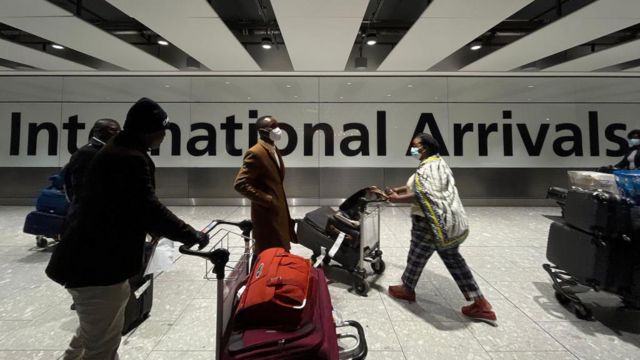In the past months, I have received several messages from people worried about their limited leave to remain in the UK. Some are approaching the end of their 2-year graduate visa, while others moved from Nigeria on a care visa and face uncertainty as their employer’s sponsorship license has been revoked by the Home Office. This leaves them limited time to find another employer or leave the UK if they don’t secure another sponsor. Based on my experience as a student 13 years ago, I’ll share a series of thoughts targeted at students, those who have recently switched to graduate visas, and those whose graduate visas will expire by the end of 2024 or early 2025. So stay with me…
If you’re wondering why people are no longer setting up ring lights for UK Japa” social media video content, or saying “Welcome to my YouTube channel,” it’s because they have stopped playing. Most are now focused on extending their visas. The first wave of people who arrived in 2020 saw their visas expire around January/February 2023. Some are back in Nigeria, while others opted for Japa 2.0. Batch 2 of the new dispensation is working hard to extend their visas or pursue another Japa 2.0 to Canada or another country “welcoming” immigrants. As of August 1, 2024, depending on when you arrived in the UK in 2021, your visa should be expiring between December 2024 and February 2025. With less than 4–6 months left on your visa, there’s no time for faffing around. So, what to do?
Here are some options to consider if you are still studying, have just started your graduate visa, or are approaching the end of your visa. Historically, there are generally six options people consider:
- Tier 2 Skilled Worker Visa
- Marry someone living in the UK
- Pursue another postgraduate degree or PhD
- Migrate to Canada or the US
- Secure a good-paying job in another country in EMEA or LATAM
- Return to Nigeria with a job
- Return to Nigeria without a job and do “I just got back” for some time
Now, there are more options, though they come with varying costs and challenges. In my case, I chose option five and returned to Nigeria with a good-paying job.
During the pandemic, the UK introduced the health and care worker visa and granted many SMEs sponsorship licenses. They also relaxed immigration rules, allowing students to switch from student visas to care visas. This led many to abandon their studies for care visas. By 2023, the UK had to introduce stricter rules to curtail the abuse of the immigration system. In 2024, students and care workers were banned from bringing dependents. Many graduates had been planning to switch to care visas or become dependents of those on care visas, but this is no longer an option unless you secure a job sponsored by the NHS.
Let’s start with the options:
Option 1: Graduate Development Programs
If you are just starting your studies, apply for graduate development programs that last 12–18 months. Most people get sponsorship from their employers after these programs. While you study, spend time applying for graduate jobs. By the time you finish your studies, you may have multiple offers.
Option 2: Global Talent Visa (GTV)
While on a student visa or at the start of your graduate visa, work towards meeting the criteria for a Global Talent Visa in digital technology, arts and culture, or research. If you are skilled in these areas, you can build your evidence to meet all the criteria. GTV is my preferred option, it offers more freedom as you are not tied to any employer. Although this is not for everyone and requires significant evidence to meet the criteria. Even after 10 years of Tier 1 Exceptional Talent, now GTV, we still don’t have up to 20,000 people with this visa. So check the endorsement guide to see if you meet the requirements. By the way, some of the evidence for the UK Global Visa can also earn you the US EB1 or EB2 visa. You can also work towards this while in the UK. Either you get GTV or you get the US EB1 or EB2 Visa. I know people who have both.
Option 3: Canada PR Pathways
While you are studying, take the IELTS and prepare for other PR pathways like Canada. Before or after your master’s, you can do the WES and get into the Canada pool. Some applied for the Canada PR immediately after they arrived in the UK or while in Nigeria. I know some people who just moved to Canada after their 2-year PSW visa expired. Some are on skilled worker visas but have Canada PR as plan B in case they lose their sponsorship in the UK. If your visa is expiring soon, still get in the pool even if you go back to Nigeria. You may be selected and can start your Japa 2.0 after a few months or a year of “I just got back.” At least you get to enjoy Naija before facing the cold in Canada.
Option 4: Skilled Worker Visa
Towards the end of your student visa or at the start of your graduate visa, spend time submitting quality applications for a skilled worker visa and preparing for interviews. If you are not getting called for interviews, you may well be turning in “weak” generic applications. If you want to limit your exposure to cancellation of sponsorship, consider NHS jobs. There are other non-clinical jobs in the NHS that offer sponsorship, and most agree to sponsor towards the end of your current visa. Importantly, with NHS jobs, you don’t pay expensive immigration surcharges. Also, apply to multinational and big companies, as they have more job security with respect to sponsorship.
Applying for jobs in big tech used to offer some kind of job security, but with the recent tech layoffs, you cannot be too sure if you can keep a tech Tier 2 job for five years to get ILR. If you get into big tech, still activate a plan to switch to Global Talent. If you get a Tier 2 skilled worker visa from a small or medium-sized company, continue to explore more stable alternatives. I have seen a couple of companies fold up and people were given 60 days to get another sponsored job. I know you have faith, but it happens. A student switched to Tier 2 dependent; less than four months into the job, hr partner’s company went under. Immediately after her husband lost his sponsorship, she applied for a graduate visa. The Home Office mistakenly granted her a graduate visa even though she had already switched from a student to a Tier 2 dependent visa. After the visa was issued, her husband and kids applied and they were refused. The Home Office also canceled her graduate visa as it was issued in error. By the way, if you switch from a student to a Tier 2 visa, you are no longer eligible for the graduate visa, so look before you leap. If you switch from a student to a care visa and lose your sponsorship, you can’t fall back on the graduate visa. The immigration rules can be interesting, so look for credible and stable employers.
Option 5: Further Studies
If you have the energy to continue studying, you can apply for a scholarship for a fully funded research degree. Don’t even attempt it if you don’t have money; it is premium “suffering.” Some people do a degree just to buy time and end up making a mess of it. If you have to do a PhD, do it well. You can end up with a sponsored job in a university, or if you are well-published during your PhD, you can get a global talent visa as a researcher, which gives you indefinite leave to remain after three years. This is a stable option, but it doesn’t come cheap. It takes “sweat and blood.” At the end, you get your ILR after 7–10 years: 3 years (MSc + PSW) + 3/4 years PhD + 3 years GTV = 10 years route to ILR.
Option 6: Jobs in EMEA
Actively apply for jobs in Europe, the Middle East, and Africa (EMEA). After my master’s, I chose this option, working briefly in Chad before returning to Nigeria to support the Africa team. Many acquaintances found jobs in the Middle East, Europe, and various African countries, often faring better than peers who stayed in the UK.
Option 7: Marriage
Some people choose to marry someone with British Citizenship or Settled Status. This provides a 2.5-year visa, renewable for another 2.5 years as long as the marriage is subsisting. However, if the relationship ends, you have 60 days to leave the UK. This route can be risky and is not advisable if the marriage is not genuine.
These are just a few options to explore. Other options come with significant stress and baggage and are prone to abuse. It’s best to avoid desperate measures to prevent living illegally in the UK. No decent life, nothing to show for it, just living from hand to mouth. May God help us all! Thanks for coming to my August talk 😊
Gatekeepers News is not liable for opinions expressed in this article, they’re strictly the writer’s







